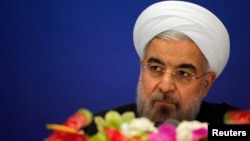Iran's president says a comprehensive agreement on curbing his country's nuclear program is very likely by July.
Iranian President Hassan Rouhani told reporters in Shanghai Thursday that reaching a deal would be achievable, but that it depends on unspecified countries not being allowed to create problems.
"I can tell you that by the end of July, if there is good will on the other side, I mean 5+1, and if they make enough efforts, and the people behind the scenes, some certain countries behind the scenes who want to create problems, if they are not given a chance to sabotage talks, then we have enough time to achieve the ultimate success," Rouhani said.
Mr. Rouhani's comments follow last week's failed round of negotiations in Vienna between Tehran and the five permanent members of the U.N. Security Council and Germany.
"If they (the talks) don't achieve success, that means the other side is very stubborn because my government is ready to be very logical," Rouhani said. "(It) is ready to interact with the rest of the world and collaborate with the rest of the world."
On Wednesday, the International Atomic Energy Agency (IAEA) said Tehran has agreed to address questions about explosives and other activity that the West says is helping it build nuclear weapons.
Iran's talks with the IAEA are separate from those with the six world powers, but both address whether Tehran's nuclear activities could involve making weapons.
Iranian President Hassan Rouhani told reporters in Shanghai Thursday that reaching a deal would be achievable, but that it depends on unspecified countries not being allowed to create problems.
"I can tell you that by the end of July, if there is good will on the other side, I mean 5+1, and if they make enough efforts, and the people behind the scenes, some certain countries behind the scenes who want to create problems, if they are not given a chance to sabotage talks, then we have enough time to achieve the ultimate success," Rouhani said.
Mr. Rouhani's comments follow last week's failed round of negotiations in Vienna between Tehran and the five permanent members of the U.N. Security Council and Germany.
"If they (the talks) don't achieve success, that means the other side is very stubborn because my government is ready to be very logical," Rouhani said. "(It) is ready to interact with the rest of the world and collaborate with the rest of the world."
On Wednesday, the International Atomic Energy Agency (IAEA) said Tehran has agreed to address questions about explosives and other activity that the West says is helping it build nuclear weapons.
Iran's talks with the IAEA are separate from those with the six world powers, but both address whether Tehran's nuclear activities could involve making weapons.





